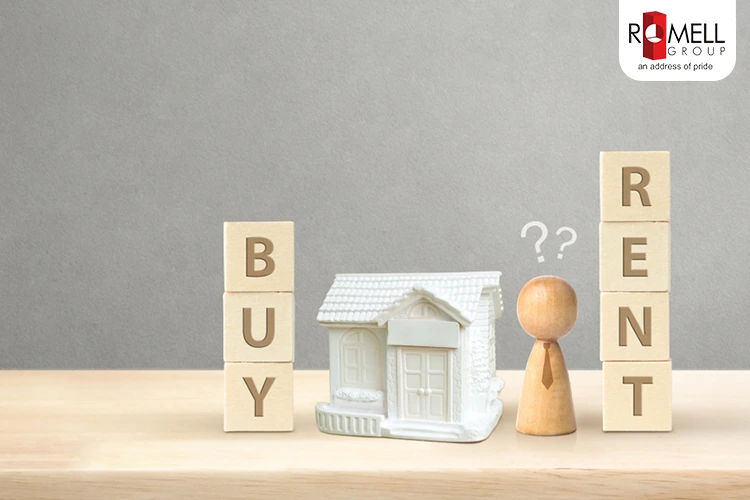The Great Debate: Renting vs. Owning – Finding the Ideal Path to Real Estate Bliss
The age-old argument of whether to rent or buy frequently presents your journey to discovering your ideal home. This in-depth guide examines the advantages and disadvantages of both options, arming you with the knowledge you need to choose wisely in your quest for real estate bliss.
The Pros and Cons of Renting a Home
Pros of Renting:
If you love change, renting affords you more flexibility than anything. You can relocate without wanting to deal with the hassles of selling your home. Renters are also freed from the responsibility of upkeep and repairs, allowing them to concentrate on the here and now. Initial costs are far lower, and stable monthly payments provide financial security.
Cons of Renting:
While renting is convenient, it doesn’t offer the opportunity to increase wealth as owning a property. Rent payments don’t help build equity or increase the value of a property. Moreover, renters have limited control over design changes, and the property’s value won’t reflect their investments.
The Benefits of Owning a Home
Benefits of Homeownership:
Owning a home is a transformative experience that goes beyond financial investment. As a homeowner, you gain equity over time as property values appreciate. This equity can be a valuable asset or a stepping stone for future investments. Homeownership allows you the creative freedom to personalize your space, making it a true reflection of your personality. Additionally, potential tax benefits and diversification of your investment portfolio add to the allure of owning. If you’re looking to own a home, then Romell Group is one of the best real estate developers in the city. From affordable to luxurious, your every requirement gets fulfilled here.
Factors to Consider:
Financial Readiness:
Make sure you are financially prepared before starting any excursion. Monitoring involves assessing your debt-to-income ratio, credit score, and savings account balances. Calculate your affordability using these numbers, accounting for mortgage payments, taxes, and insurance prices.
Lifestyle Preferences:
Your lifestyle preferences are paramount in this decision-making process. Consider the level of stability you desire and your inclination towards community involvement. Owning a home sometimes implies more loyalty to a location and community, whereas renting offers the flexibility to relocate without hassle.
Long-Term Goals:
Contemplate your long-term goals and aspirations. Do you view this property as an investment? Assess your willingness to manage property maintenance. Consider prospective career shifts or life transitions that may impact your housing status.
Steps to Successful Homeownership
- Assess Finances:
Before you embark on your journey toward homeownership, it’s crucial to have a clear understanding of your financial situation. This step involves evaluating your financial readiness and determining how much you can afford.
● Secure a Pre-Approval: Getting pre-approved for a mortgage or home loan is a crucial first step. It gives you a precise sense of how much the lender is willing to lend based on the credit history and present income. This pre-approval helps you establish a budget for your home search.
● Save for a Down Payment: One of the most significant financial requirements when buying a home is the down payment. Even though commonly 20% of the purchase price is suggested, other lending choices are also available with differing down payment requirements. Saving diligently for your down payment will impact monthly mortgage payments and interest rates.
2. Research and Location
Selecting the right location for your future home is crucial, as it will impact your daily life and potential property value appreciation.
● Explore Neighborhoods: Look at several areas that suit your preferences and align with your lifestyle. Consider proximity to work, schools, shopping centers, public transportation, and other factors. Investigate the crime rates and overall safety of the area.
● Property Values and Market Trends: Research the market conditions and property values in the areas you’re considering. Understanding how property values have changed over time can help you make an informed decision about potential property appreciation.
3. Home Inspection and Negotiation
Once you’ve found a property that meets your criteria, it’s essential to investigate it further to ensure you’re investing wisely.
● Home Inspection: Hiring a professional home inspector is essential to identify any potential issues with the property. The inspector will evaluate the house’s condition, considering plumbing, electrical, structural soundness, etc. The inspection report will help you negotiate repairs or adjustments to the purchase price if necessary.
● Negotiation: After the generation of the inspection report, you can negotiate with the vendor, requesting repairs or a price reduction after finding significant issues that need to be solved. Skilled negotiation can help you reach a mutually beneficial agreement.
4. Legal and Paperwork
Navigating the legal aspects of buying a home requires careful attention to detail and expert guidance.
● Engage a Real Estate Attorney: Hiring a qualified real estate attorney is highly recommended. They will check contracts, provide legal counsel, making sure all the paperwork is in order. Their expertise is invaluable in protecting your interests throughout the process.
● Review Contracts: Thoroughly review all contracts and agreements related to the purchase. These documents include the purchase agreement, property disclosures, and any addenda. Make sure you understand the terms and conditions before signing.
5. Closing the Deal
It’s crucial to ensure that all the required documentation and payments are in order as you approach the closing stages of homeownership.
● Complete Paperwork: On the closing day, a significant amount of paperwork needs to be signed, which includes the mortgage agreement, title transfer documents, and more. Take your time to review each document and ask questions if anything is unclear.
● Obtain Homeowner’s Insurance: To protect your investment, you must obtain homeowner’s insurance before closing. Lenders typically require insurance to protect their investments in case of unforeseen events.
You will be well-prepared to start the homeownership journey if you carefully analyze and pay attention to each stage. Remember that each step contributes to a smooth and successful transition into your new home, allowing you to enjoy the benefits of owning real estate.
Conclusion
The path to real estate bliss is personal, influenced by your financial standing, lifestyle preferences, and long-term goals. By weighing the pros and cons of renting and owning and following the outlined steps to successful homeownership, you can confidently embark on a journey that aligns with your dreams and aspirations. Remember, the key to real estate bliss lies in making an informed decision that suits your unique circumstances.








